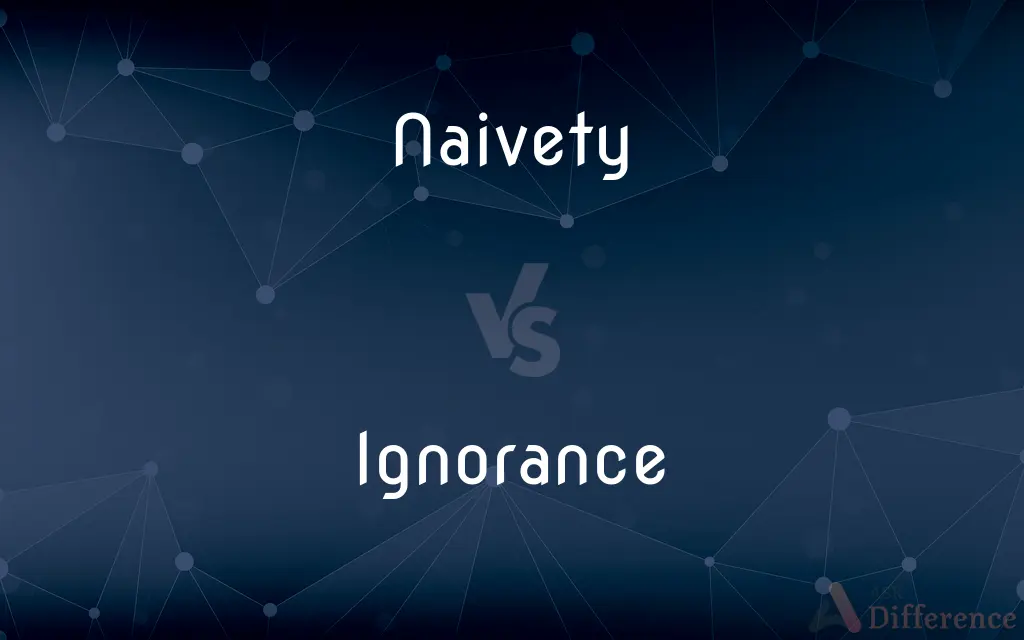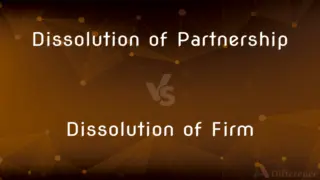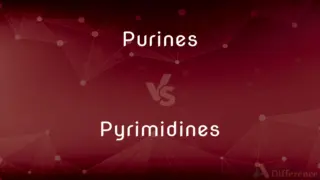Naivety vs. Ignorance — What's the Difference?
Edited by Tayyaba Rehman — By Fiza Rafique — Published on October 11, 2023
Naivety denotes a lack of experience or sophistication. Ignorance is a lack of knowledge or awareness about something.

Difference Between Naivety and Ignorance
Table of Contents
ADVERTISEMENT
Key Differences
Naivety and Ignorance, although subtly related, are two words describing distinct concepts. Naivety primarily relates to innocence or simplicity, stemming from a lack of worldly experience or sophistication. Such lack of experience might lead one to make decisions without understanding their full implications. Naivety often carries a connotation of being easily fooled or not being alert to potential harm or deceit.
In contrast, Ignorance pertains to the absence of knowledge or information regarding a specific topic or subject. This absence is not necessarily a result of one's innocence or simplicity. Instead, it could arise from not having been exposed to certain information or choosing not to seek out knowledge. Unlike Naivety, Ignorance doesn't imply innocence; it just signifies a gap in awareness or understanding.
It's crucial to understand that while Naivety might result in unintentional errors due to innocence, Ignorance leads to mistakes stemming from a lack of knowledge. For instance, a naive individual might trust a stranger, thinking the world is inherently good. In contrast, an ignorant person might make incorrect assumptions about a culture they know nothing about.
Comparison Chart
Primary Definition
Lack of experience or sophistication
Lack of knowledge or awareness
Implies
Innocence, simplicity
Unawareness of specific information
ADVERTISEMENT
Originates from
Limited exposure to complexities or deceit
Not having been exposed to or seeking knowledge
Connotation
Often positive or neutral, suggesting purity
Neutral, but can be negative if deliberate
Rectification
Gained through life experiences
Through education or seeking information
Compare with Definitions
Naivety
Simplicity or unsophistication in understanding.
His naivety led him to see the world in black and white terms.
Ignorance
Lack of knowledge or information about a subject.
His ignorance of the country's customs was apparent.
Naivety
Being easily impressed or deceived due to innocence.
Her naivety made her the prime target for scams.
Ignorance
Absence of awareness or education.
Their ignorance about world events was surprising.
Naivety
Innocence stemming from a lack of experience.
Her naivety was evident when she believed the obvious tall tale.
Ignorance
State of being unaware or uninformed.
Ignorance of the law is not an excuse for breaking it.
Naivety
Absence of worldly-wise qualities.
His naivety was clear when he was easily tricked in the marketplace.
Ignorance
Choosing not to know or recognize facts.
His ignorance towards scientific evidence was frustrating.
Naivety
Trustfulness or lack of guile.
She approached everyone with such naivety that it was refreshing.
Ignorance
The condition of being uneducated, unaware, or uninformed.
Naivety
Artlessness or credulity; naiveté.
Ignorance
The condition of being uninformed or uneducated; lack of knowledge or information.
She shows total ignorance about the topic at hand.
Naivety
Naïveté.
Ignorance
Sins committed through ignorance.
Naivety
Lack of sophistication or worldliness
Ignorance
The condition of being ignorant; the lack of knowledge in general, or in relation to a particular subject; the state of being uneducated or uninformed.
Ignorance is the curse of God,Knowledge the wing wherewith we fly to heaven.
Ignorance
A willful neglect or refusal to acquire knowledge which one may acquire and it is his duty to have.
Ignorance
The lack of knowledge or education
Ignorance
Not having been exposed to certain knowledge.
Her ignorance about classical music was because she grew up listening to rock.
Common Curiosities
Which is easier to overcome, Naivety or Ignorance?
Both can be addressed, but Ignorance might be simpler through education.
Can Ignorance be intentional?
Yes, one can choose to remain uninformed about a topic.
Can someone be both naive and ignorant?
Yes, one can lack both experience (naivety) and knowledge (ignorance).
Is Naivety always negative?
Not always. It can sometimes suggest innocence or purity.
Can Naivety be an asset?
In some situations, a fresh, unbiased perspective can be beneficial.
Are Naivety and Ignorance synonyms?
No, they have different connotations and meanings.
How can one overcome Naivety?
Through varied life experiences and exposure to complexities.
Does Naivety decrease with age?
Often, as people gain experience, but it can persist in some.
Is "ignorance is bliss" always true?
Not always, but sometimes not knowing can prevent worry or stress.
Is it wrong to be ignorant about a topic?
Not necessarily, but willful ignorance can be problematic.
Is all Naivety based on lack of experience?
Predominantly, though it can also arise from innate innocence.
Does everyone have some form of Ignorance?
Yes, no one can know everything about every subject.
How is Naivety different from gullibility?
While related, gullibility is a broader tendency to be easily fooled.
Why is Ignorance sometimes looked down upon?
Deliberate Ignorance or not seeking knowledge when needed can be seen negatively.
Can education always solve Ignorance?
It can help, but willingness to learn is also key.
Share Your Discovery

Previous Comparison
Dissolution of Partnership vs. Dissolution of Firm
Next Comparison
Purines vs. PyrimidinesAuthor Spotlight
Written by
Fiza RafiqueFiza Rafique is a skilled content writer at AskDifference.com, where she meticulously refines and enhances written pieces. Drawing from her vast editorial expertise, Fiza ensures clarity, accuracy, and precision in every article. Passionate about language, she continually seeks to elevate the quality of content for readers worldwide.
Edited by
Tayyaba RehmanTayyaba Rehman is a distinguished writer, currently serving as a primary contributor to askdifference.com. As a researcher in semantics and etymology, Tayyaba's passion for the complexity of languages and their distinctions has found a perfect home on the platform. Tayyaba delves into the intricacies of language, distinguishing between commonly confused words and phrases, thereby providing clarity for readers worldwide.













































